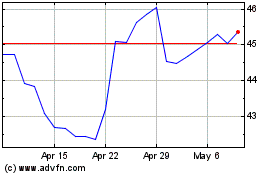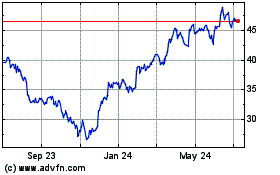By Adrienne Roberts and Sean McLain
This article is being republished as part of our daily
reproduction of WSJ.com articles that also appeared in the U.S.
print edition of The Wall Street Journal (October 4, 2018).
Honda Motor Co. is investing $750 million in General Motors
Co.'s self-driving car unit, with plans to commit an additional $2
billion in coming years, for the joint development of a
mass-produced fully autonomous car.
Auto makers and technology giants have been scrambling to plant
stakes in a transportation landscape that is swiftly being reshaped
by technology.
Honda will work with GM Cruise LLC to develop a driverless car
from the ground up that can be manufactured in high volumes and
deployed globally. The companies are also exploring opportunities
to establish a network of autonomous vehicles.
"This is a partnership that has a running start to it and will
allow us to move very quickly," said GM President Dan Ammann, who
has been minding the company's autonomous-vehicle efforts.
In 2013, the two companies said they would co-develop hydrogen
fuel-cell systems. In June, Honda announced that it would source
electric-vehicle batteries from GM for some of its vehicles.
Honda will invest the $750 million in GM Cruise immediately,
while the $2 billion will be spread out over 12 years, the
companies said Wednesday. Honda will take a 5.7% stake in Cruise as
a result.
Japan's SoftBank Group Corp. took a 19.6% stake in Cruise in
June with an investment of $2.2 billion . Together, the Honda and
SoftBank equity investments bring GM's valuation to $14.6
billion.
The Detroit auto maker set up Cruise as a separate business unit
to draw in investors who don't want exposure to the cyclical,
low-margin business of manufacturing cars. Ford Motor Co. in July
created a similar setup for its autonomous-vehicle business.
The funding from SoftBank and Honda also allows GM to continue
developing driverless-vehicle services without siphoning capital
away from its traditional car-making business. Previously, GM said
the infusion from SoftBank would enable Cruise to launch a
robot-taxi service in an undisclosed city sometime in 2019.
GM shares rose 2.1% to $34.01 on Wednesday.
Honda's decision to invest in GM's self-driving arm reflects a
culture change under way at the Japanese car maker, which long
prided itself on its engineering prowess, shunning technologies
developed by outside companies. Honda Chief Executive Takahiro
Hachigo has been on a deal-making spree, with particular focus on
electric and autonomous vehicles.
The deal with GM Cruise is a bit surprising as Honda has been in
talks to partner with Alphabet Inc.'s driverless-car firm Waymo for
nearly two years. Honda disclosed the talks with Waymo in December
2016, but the two companies have yet to announce concrete
plans.
In a statement, Waymo, which began as Google's
autonomous-vehicle program, said it continues to discuss
opportunities with Honda, as well as other auto makers.
Car companies have been teaming up with tech firms and suppliers
to develop driverless technology. GM's pact with Honda is a further
sign that traditional auto makers will look to join forces with one
another as they try to fend off Waymo and others vying to lead in a
technology that could upend the transportation sector.
The Honda deal also shows that the Cruise and its underlying
technology can attract interest from industry rivals.
In a note to investors in May, Piper Jaffray & Co. said it
expects only a handful of "winners" to emerge from the race to
commercialize driverless vehicles. That prospect and the large
capital outlays required to develop the technology could lead to
more collaboration among automotive competitors.
Fiat Chrysler Automobiles NV has joined a BMW AG-led consortium
to develop self-driving car technology with the aim of producing
fully automated vehicles by 2021. BMW launched the partnership with
Intel Corp. and Israeli car-camera software provider Mobileye NV in
2016.
Toyota Motor Corp. announced in August it would invest $500
million in Uber Technologies Inc. as part of an agreement by the
companies to work jointly on autonomous vehicles. Uber will
integrate its self-driving technology into Toyota Sienna minivans
for use in Uber's ride-hailing network.
Honda has signed deals with China's Baidu Inc. and SenseTime Co.
to work on self-driving technology. Camera software from SenseTime
has helped Honda improve the performance of its self-driving
prototypes.
Honda also has close ties with SoftBank. The auto maker is
working with SoftBank-backed Cocoro SB to develop artificial
intelligence software for self-driving cars, which will allow those
vehicles to understand and emulate human emotions.
Piper Jaffray analyst Alexander Potter said GM is better
positioned than other auto makers and even large technology
companies because of the progress with Cruise and GM's experience
with mass production.
"We think GM has a structural advantage over peers, including
Silicon Valley disruptors," Mr. Potter wrote.
--Mike Colias contributed to this article.
Write to Adrienne Roberts at Adrienne.Roberts@wsj.com and Sean
McLain at sean.mclain@wsj.com
Corrections & Amplifications Honda will make a $750 million
investment in GM Cruise LLC immediately. An earlier version of this
article incorrectly stated the amount as $750. (Oct. 3, 2018)
(END) Dow Jones Newswires
October 04, 2018 02:47 ET (06:47 GMT)
Copyright (c) 2018 Dow Jones & Company, Inc.
General Motors (NYSE:GM)
Historical Stock Chart
From Aug 2024 to Sep 2024

General Motors (NYSE:GM)
Historical Stock Chart
From Sep 2023 to Sep 2024
